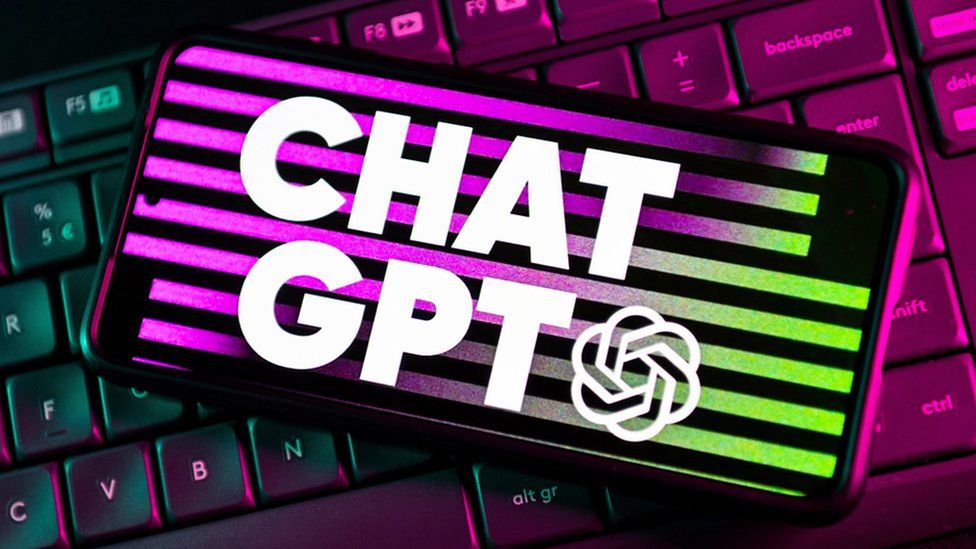ARTICLE AD BOX
 Image source, Getty Images
Image source, Getty Images
By Lara Lewington
Presenter, BBC Click
"You have to try it", my colleague said - enthusiastically shoving his phone in front of me.
We were heading home from my prancing about a warehouse wearing a special backpack and frame which gave me super strength to move boxes. It had felt eerily futuristic, but a new future had just arrived.
It was November 2022, and OpenAI's ChatGPT chatbot was up and running, and as long as it was not at capacity, anyone could test it.
ChatGPT is amazing - the follow-ups it can process, such as "make it less formal", "make me sound northern", are mind-blowing.
ChatGPT is the latest in a series of AIs which the firm calls GPTs, an acronym which stands for Generative Pre-Trained Transformer.
It works like a supercharged predictive text, putting one word in front of another based on statistical probability. Its lack of actual knowledge does not dampen its ability to sound convincing, and terrifyingly human.
But dig deeper, play harder, try and make it "steal your job" and you might just come back to earth with a (comforting) bang.
Stirring debate
At an Ethics in AI event at University of Oxford (yup, that is what I get up to in my spare time) several weeks later, Radio 4 called to ask me to make a documentary on ChatGPT - maybe it could even help.
While the production brewed in the background, the calls flooded in from numerous media outlets.
The years of "it's too techie/no-one understands it/people are scared of AI/ our viewers aren't interested in technology", seemed to have come to an abrupt halt.
The access to test this large language model generative AI had changed things.
People played with it, universities grappled with what usage they allowed of it, professionals questioned what it meant for them - everyone was getting in a frenzy. It often got things wrong, hallucinated as it is known, but the issue was, it also got things right.
Image source, Getty Images
When it comes to what AI means for us, I had had the luxury of listening to the world's leading academic analysis being part of the conversation. I didn't want to keep it to myself, this topic matters to me and it should matter to all of us. And now the debate has gone mainstream.
We cannot just let things happen because they are technologically possible. We need to discuss, deliberate, and decide the role AI will play in our world, our relationship with it and each other, how we deal with its bias, and the decisions we guide it to make.
Sentient sense of sensibility
Producing the documentary provided a moving target. No sooner had we bagged the guests and covered the issues, than new scenarios emerged. Some were speculative, but some presented dilemmas.
We interviewed the experts, those embracing it creatively, those who were wary, and some who just want to know what it will mean for their livelihoods.
For the programme we played around with it writing an intro, questions and a conclusion. You can make of its work what you will, but what initially felt awe-inspiring, often descended into the absurd.
"Good day tech enthusiasts…" is not my usual greeting of choice. Maybe it should be, or the AI knows better and perhaps we are going to lose all sentient sense of sensibility anyway.
This is the first version of the technology we have seen. Of course it is impressive, and yes, this is a real turning point in AI.
I am certainly not knocking the immeasurable opportunity and possibility that will ensue. There will also be pitfalls and many challenges we have never even contemplated.
Whether it is Dall-E generating art, Google's Bard or any future rivals, this is a time of change, and the systems will only improve.
Mistakes and surprises
Image source, Getty Images
Image caption,Microsoft chief executive Satya Nadella said the launch of AI-powered Bing marked "a new day for search"
As a test user for Bing AI, I've experienced search powered by ChatGPT. Never has "knowledge is power" felt so true.
Add some actual information to a technology that knows how to sound human, and you are really (virtually) talking.
It helped me plan dinner for 17, improve my workout, and book some sightseeing. Its choice of links was surprising, and its guidance was not gospel, but it seemed reasonable, and useful.
However, a quest to find a vegan restaurant near a filming location next week may have been as frustrating for it, as it was me. Maybe I was being too picky - how very human.
It has been known to reflect the spirit of its interrogator, but testing it did come with the caveat that we are learning together, and there would be some mistakes and surprises.
ChatGPT (or any of its rivals) are far from replicating the nuances of human behaviour, or the complexity of human thought. They have not lived after all, and they are not human. But there is a lot they can do.
In making the documentary, ChatGPT had its moments where, despite my trust issues with it, it was helpful.
But I could not bounce ideas off it or mull things over, and it could not differentiate between a passing comment or a "this needs to be in". Thank heavens for my very human producer Fiona.
How well it did the job of playing virtual producer, you can decide for yourself. But I do not think I will be hanging up my BBC lanyard just yet.
A Documentary: By ChatGPT, with Lara Lewington, on Radio 4 and BBC Sounds, 20:00 GMT Monday and on demand afterwards.

 2 years ago
47
2 years ago
47








 English (US) ·
English (US) ·